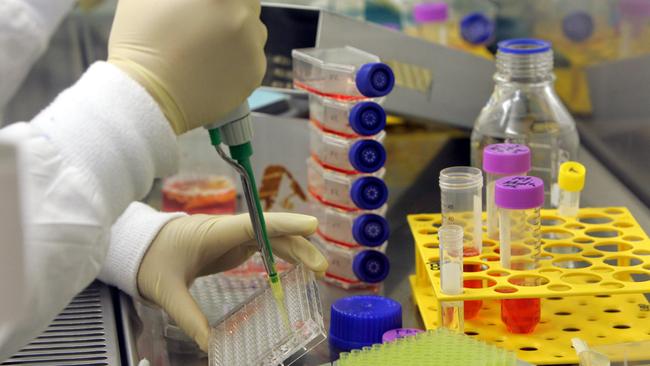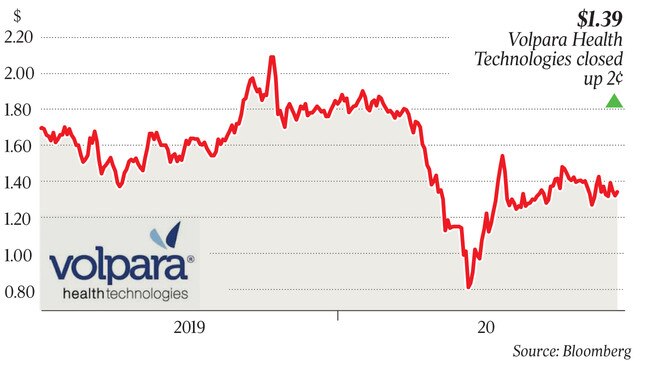Three biotechs worthy of your research

The latest sensation is a potential COVID-19 vaccine that is being developed by the Massachusetts-based Moderna Therapeutics using an unproven “messenger RNA” approach based on genetic sequence that it hopes allows it to effectively program a vaccine. ASX-listed Moderna climbed 20 per cent on the day the news broke and it has doubled since.
Safe to say also that it wasn’t an accident that the company raised $US1.25bn ($1.82bn) almost immediately after the news.
At a broader level, however, investors are clamouring for health stocks now more than ever before.
Why? One reason is that they’re looking for growth in a no-growth world, evidenced by near zero long-term interest rates caused partly by the trillions being shovelled into bonds by central banks. Investors are going up the risk curve in search of returns. But are the big returns investors are anticipating from health-related technology stocks realistic?
The vast amounts of money being raised by the sector in the past few months is despite the delay of all-important medical trials due to COVID-19 related issues. On the other hand, the good thing about health stocks is that they have embraced technology for a long time. The IP in health is far ahead of anything even so-called sophisticated investors can grasp. This doesn’t stop them pretending to, however.

This mismatch between science and investment thirst for big returns has always been a factor in biotechnology. Stocks like the synthetic dermis replacement specialist Polynovo (PNV), stem-cell therapy developers Mesoblast (MSB) and Avita Medical have interesting technology coupled with negligible sales, yet they command billion-dollar-plus valuations: Mesoblast investors in particular are sweating on the FDA opinion on the outcome of late-stage trials for its respiratory drug, Remestemcel-L.
How does an investor make sense of all this? It’s better to invest in a product that’s been approved, at least somewhere in the world, even if it’s not by the gold standard US Food and Drug Administration. I often shy away from drug developers, simply because the probability of approval is so low. Medical technology or device and diagnostic developers are much safer bets in my experience. Another thing I look at is revenue. Is this company generating sales, and from whom? How broad is the customer base? It helps to look at the balance sheet, because these companies often raise money. The stronger the balance sheet the better. I don’t like investing in stocks that have run hard. I don’t like chasing. I left that behaviour behind in my 20s. Here are three mid-cap medical tech stocks worth checking out.
Cyclopharm (CYC)
There are at least 3 million cases of pulmonary embolism globally each year. Cyclopharm sells Technegas generators to radiology departments on a recurring basis.
The stock is trading on a reasonable revenue multiple but has huge potential to grow its market substantially if it gains approval for sales into the US. Technegas has generated revenue in 57 countries. More than 195,000 patient procedures in 2018, 4.2 million patient procedures since 1986. With 1600 Technegas generators sold globally, CYC’s underlying business is profitable and supports a small dividend.
Volpara (VHT)
The New Zealand-based company’s software enables early detection of breast cancer by using its proprietary artificial intelligence technology to improve breast screening. The technology allows for the objective measurement of breast density, which is associated with breast cancer risk. Legal, regulatory and medical association guidelines are moving towards breast density measurement being the gold standard in breast cancer screening. Sales are climbing in the US market, aided by the acquisition of US-based specialist radiology clinic management software provider MRS Systems in June last year for $US14.6m. This has increased fivefold the company’s access to US breast imaging clinics.
Ecofibre (EOF)
The hemp industry is experiencing rapid growth and Ecofibre has a diversified business. It produces a range of hemp-derived nutraceutical products; plus it is developing a hemp-based fibre products business. Ecofibre operates in the US where it sells to pharmacies. The company has net cash and is profitable.
Richard Hemming is an independent analyst who edits undertheradarreport.com.au







Suddenly, the stockmarket is interested in health, especially our biotech sector. You know the sector is red hot when the results of just eight people from a 45-person trial can move not just one company but the wider market.